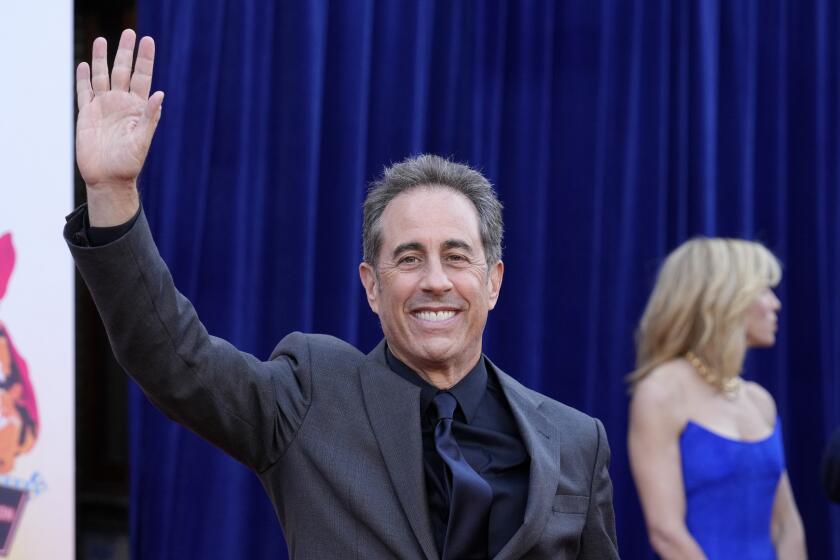Will Wasserman Get Less Than He Wants for MCA? : Entertainment: The answer could come Sunday, when directors continue their meetings over Matsushita’s bid.
Has Lew R. Wasserman lowered his expectations for MCA Inc.?
That question may be answered as early as Sunday, if MCA and its 77-year-old chairman proceed with reported plans for a New York board meeting to consider Matsushita Electric Industrial Co.’s bid for the Hollywood conglomerate.
After weeks of bargaining--and years of flirtation with various suitors--Wasserman is pondering a Matsushita buyout offer that is said by several sources to be lower than the price he had long demanded for his company, which owns Universal Studios.
Bargaining between MCA and Matsushita continued Friday in New York, and positions may still change. But individuals close to the talks have said negotiators were discussing a deal under which MCA shareholders would receive between $70 and $75 a share, or as much as $6.85 billion, including both cash and the value of stock in a new spin-off that would own the company’s New York-area TV station.
MCA insiders say Wasserman has talked in the past of getting as much as $100 a share for MCA and had expected the negotiations with Matsushita to be conducted in a framework ranging between $75 and $90 a share, or as much as $8.22 billion.
But Matsushita and its top U.S. representative, Creative Artists Agency Chairman Michael Ovitz, came in much lower, apparently arguing that MCA’s worth has declined because of softening markets both here and in Japan. In the words of one Matsushita partisan: “Look at what’s happened to asset values. They’ve gone down.”
Wasserman is said to be hungry for a buyer because he believes that media companies will need vast financial resources to compete in coming decades, and because he fears that no successor would succeed in keeping MCA away from predators and break-up artists.
Yet the rough bargaining has left the MCA chief with an excruciating dilemma: Should he reject the offer and risk seeing his company’s stock collapse to less than $35 a share, where it traded before the Matsushita talks surfaced? Or should he take the money, and risk capping his 54-year MCA career with a disappointment?
As recently as Wednesday evening, Wasserman is said to have favored scrapping the talks because Matsushita was offering too little. But some 11th-hour changes in bargaining positions allowed the discussions to continue, amid some expressions of pessimism on both sides. Spokesmen for both companies have declined to discuss the talks.
“I would be personally shocked to see a deal for $70 to $75. Shocked and disappointed,” said Michael Klein, an executive with Los Angeles-based Gruntal & Co., which represents what Klein characterized as a “huge group” of MCA shareholders.
MCA shares dropped $3.125 to $65.375 as more than 1.6 million shares traded hands in New York Stock Exchange composite trading, amid press reports that any buyout would probably bring less than had been expected.
Klein and others have assumed that Wasserman would command a higher price thanks to his reputation as a hard-nosed bargainer. They have also theorized that Wasserman could simply reject an inadequate offer, while waiting for a counter-bid from some big American company.
That might become more likely if a change in federal “financial interest and syndication” rules makes it easier in the next few months for giants such as General Electric or Capital Cities/ABC to couple a film producer such as MCA with their broadcast interests. “Knowing Lew as I do, I still have to believe that he would like to wrap this deal in the American flag,” said one stockholder and longtime associate of the MCA chairman. Wasserman was once Ronald Reagan’s agent and has been a major contributor to both Democrats and Republicans.
But buyers for a company as big as MCA are rare birds in the best of circumstances--Lazard Freres & Co., MCA’s investment banker, has been scouring the globe for years in search of a viable bidder for MCA.
And no hint of a counteroffer appears to have surfaced during the bargaining with Matsushita, despite a number of earlier approaches by companies such as Sony Corp., Walt Disney Co. and RCA Corp. “In this kind of market, any deal that can get done is a good deal,” said one big MCA shareholder, who declined to be identified.
Many media and entertainment stocks are trading near their 52-week lows, and investors have been made especially wary by the steep decline in Time Warner Inc. stock since Time Inc. bought Warner Communications last year.
Such big MCA shareholders as Los Angeles-based Capital Group Inc. and music mogul David Geffen had reportedly expected a minimum of $80 a share for their stakes in the company, which total about 15 million shares. But sources familiar with those investors on Friday indicated that both would accept a buyout in the reported range without complaint. Neither Geffen nor Capital Group analyst Gordon Crawford returned calls seeking comment.
(At a hypothetical $72.50 per share, Geffen would reap a $180-million profit on his shares, which were valued at $54.50 each when he received them earlier this year in the sale of his record label to MCA. But part of the payout would be tied up in stock of the TV spin-off, which is said to be valued as high as $6 a share.)
If Ovitz and the Matsushita officers had offered a so-called preemptive bid of $80 or more, many investors feel Wasserman would have had little choice but to accept. But the relatively low apparent bid may place a great deal more emphasis on questions of corporate governance: Will the Japanese company ultimately be a good parent to the company that Wasserman helped build with MCA’s founder, the late Jules Stein?
Matsushita is said to have agreed to give a wide range of MCA executives employment contracts for as long as five years. But the mood at the bargaining table has been tense, according to a number of individuals, and Wasserman is said to have been angered by repeated press leaks and what he regards as “low-ball” bargaining by the Japanese.
While such factors don’t affect the arithmetic of any deal, they are likely to make Wasserman’s decision unusually difficult.
As one longtime associate put it on Friday: “I don’t think even he knows what he’s going to do.”
More to Read
The biggest entertainment stories
Get our big stories about Hollywood, film, television, music, arts, culture and more right in your inbox as soon as they publish.
You may occasionally receive promotional content from the Los Angeles Times.






